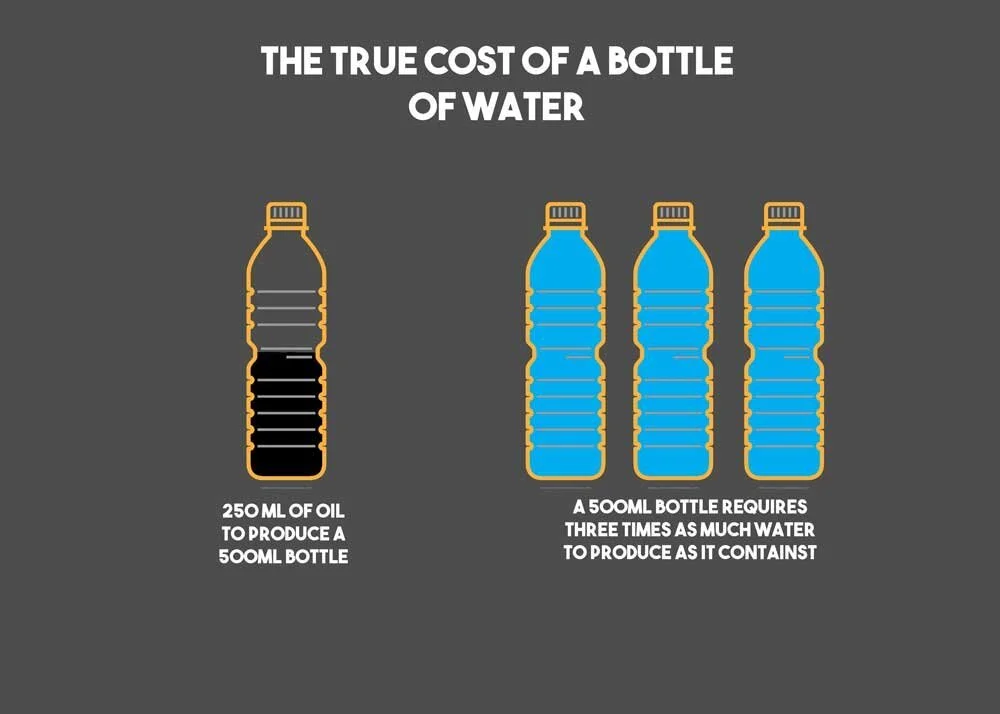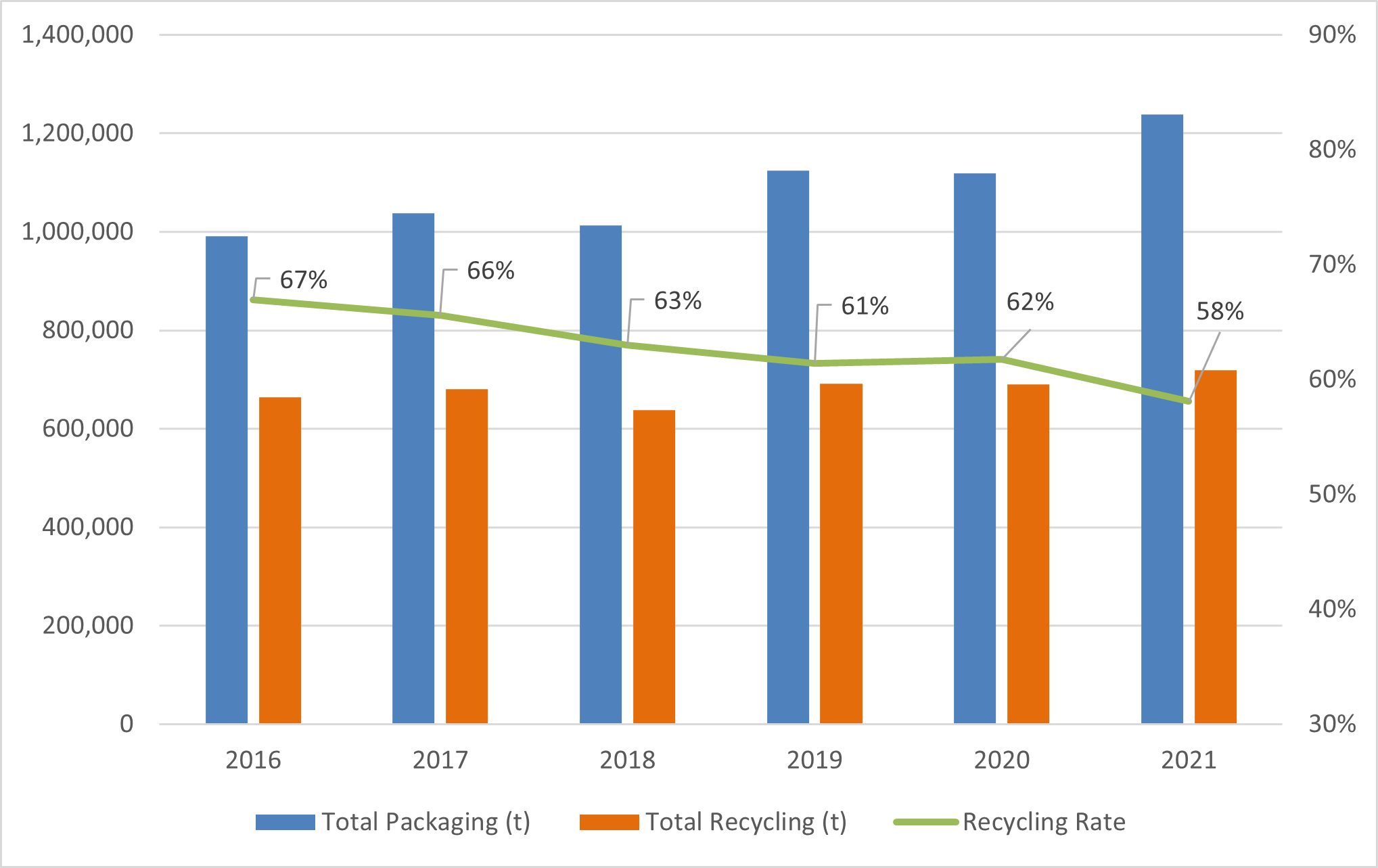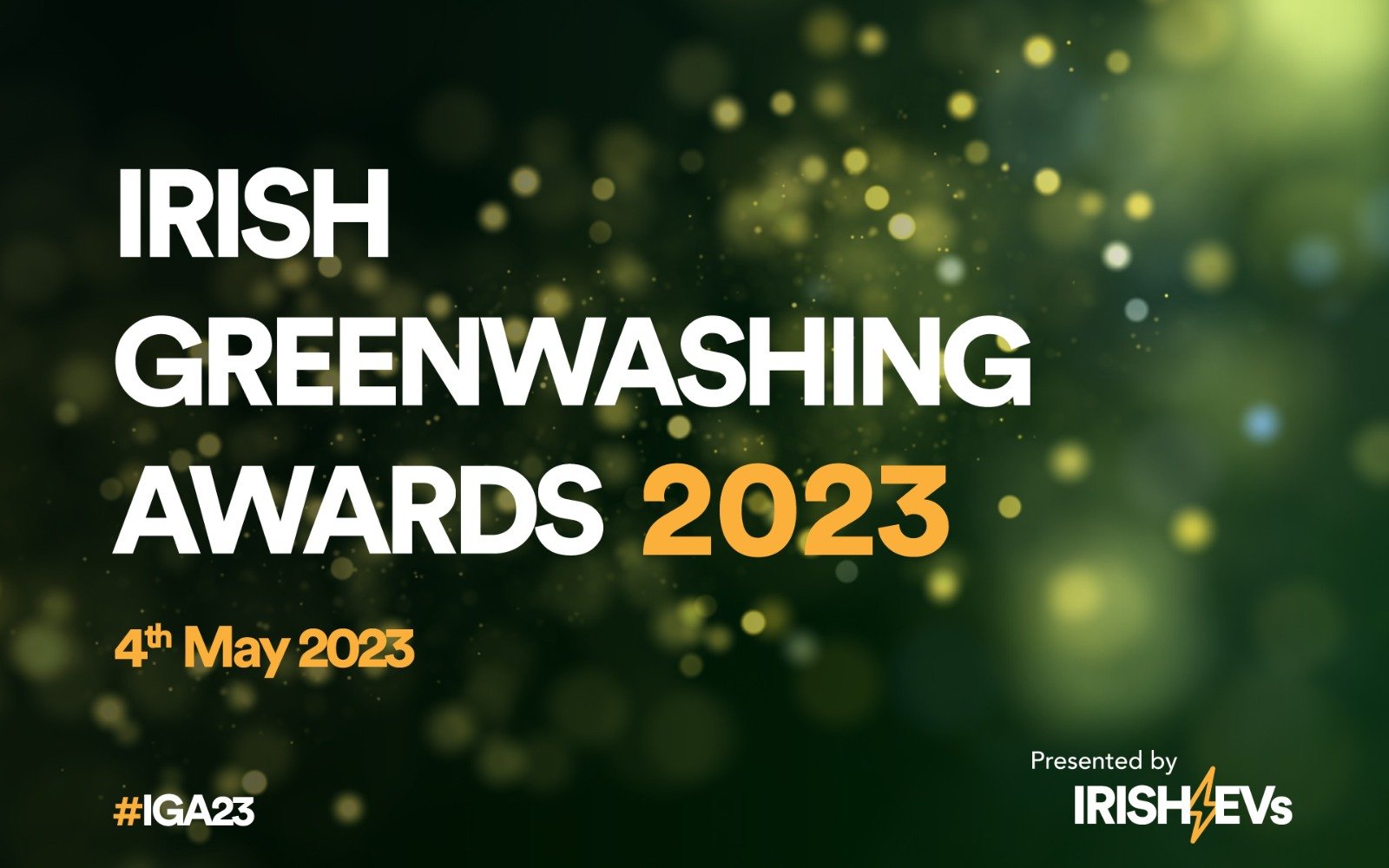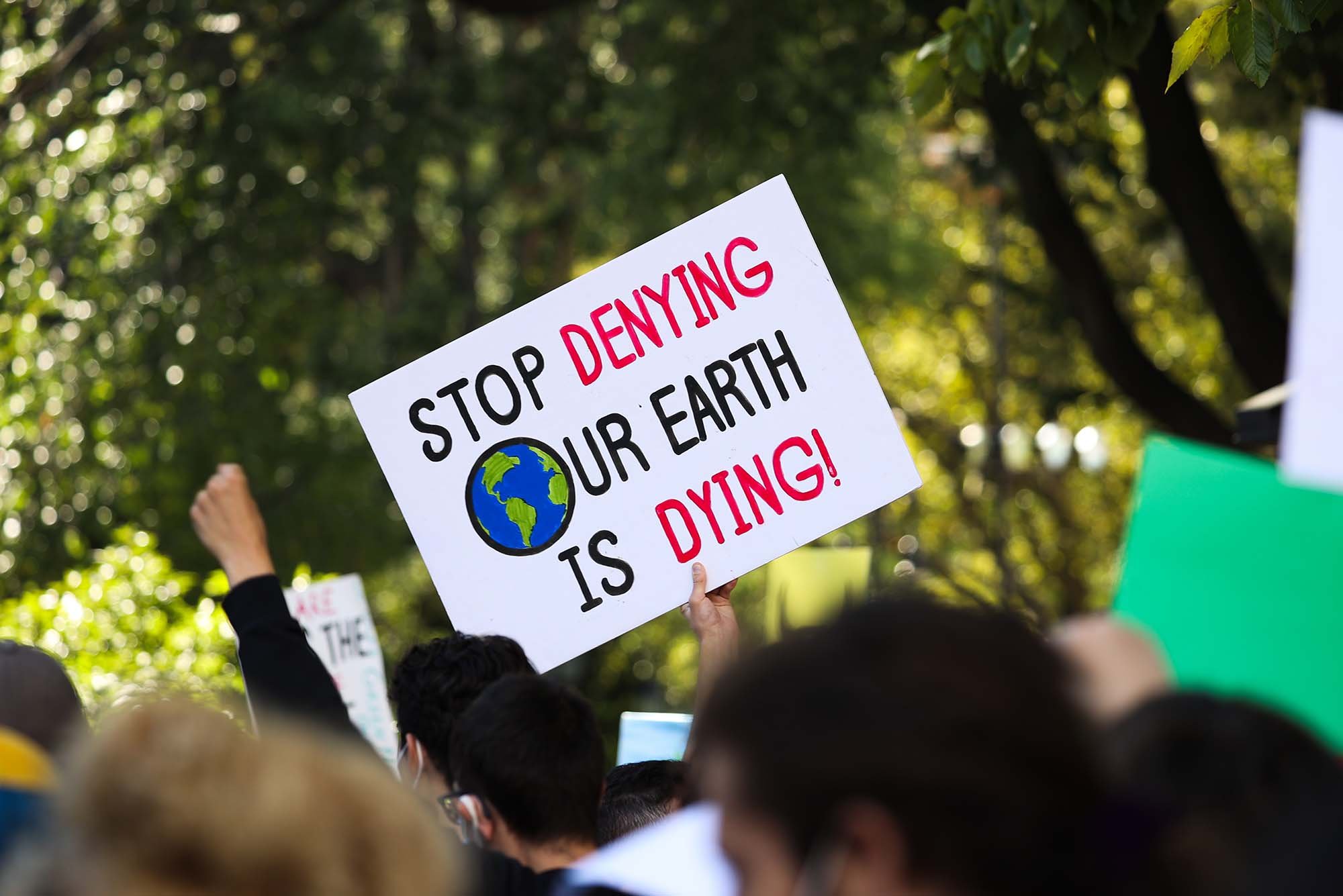
Plastic Bottle Recycling Scheme Another Climate Cop Out
On 1st February, Ireland is to introduce a new recycling scheme aimed at increasing the amount of plastic bottles and drinks cans that we recycle. The Deposit Return Scheme will see shoppers taxed a small fee that they can then recoup once the bottle is put into a recycling machine in a local shop.
This might sound like a good idea – and early indications from newspaper polls suggest that the majority of Irish people support the idea – but, in reality, it is yet another missed opportunity to effect real change that will benefit the Climate Emergency.
Why Is This Happening?
As of 2021, just 28% of Ireland’s plastic packaging waste was being recycled.
And the amount of plastic packaging waste has been growing, with the volume increasing 11% year-on-year in 2019 – the third year in a row that it exceeded the 1 million tonne mark.
In a piece produced by RTE News, Ciaran Foley, CEO of Re-Turn, said: “We currently have good recycling systems in place in Ireland through our mixed dry recycling bins, but we achieve approximately 55-60% recycling on these products. You’ll find some of the schemes around Europe include glass, but the good news for Ireland was that we already recycle over 80%, which is where we need to be.”
Ireland was the biggest plastic waste producer in the EU in 2015. As a nation, we consume 1.9 billion plastic bottles and drinks cans per year - that’s 380 per person, per year. Credit: thejournal.ie
So, there we have the answer. We’re doing this not because it is the right, most ethical, most climate-conscious approach, but because our government has failed to act on recycling rates in the same way that it has failed on every single climate target.
In reality, 71% of all the plastic waste generated in Ireland ends up being burned. That’s just under 220,000 tonnes of plastic being burnt, emitting incredibly harmful chemicals and toxins that worsen public health while also worsening the Climate Crisis.
Furthermore, the Irish Environmental Protection Agency has previously warned that the country is ‘overly reliant’ on exporting waste, with almost 382,000 tonnes of waste sent abroad for incineration in 2021 alone.
We have contacted several governmental departments to ask how they plan to avoid exporting more plastic waste if the Deposit Return Scheme is a success, and how they can justify the creation of avoidable emissions from sending waste abroad.
Just 28% of the plastic packaging we consume in Ireland ends up being recycled - and just 7% of that occurs in Ireland. The rest is being sent overseas, creating new emissions in the process. Credit: Irish Environmental Protection Agency
They have yet to respond. But it feels obvious that if we cannot domestically process all the recycling that we already create, that creating more will only increase the amount we export.
The lack of a thought-through approach can also be seen in the fact that bottles bought prior to the 1st February will be exempt from the scheme.
Had they been, we might have not only seen greater enthusiasm to embrace recycling, but there may have also been a net benefit for cleaning up the Irish environment by giving value to the plastic bottles that litter every verge, hedgerow and beauty spot around the country.
Quickly, we can start to see that the Deposit Return Scheme is yet another sticking plaster for a broken system that could have simply been replaced all together.
More Consumption, More Oil
In reality, the Deposit Return Scheme does nothing to reduce plastic consumption or waste.
While it may, hopefully, have a small impact on increasing the amount of recycling, it won’t fundamentally change the fact that more than 1.9 billion drinks bottles and cans that are consumed each year in Ireland
The vast majority – if not all of them – are made from virgin plastic. That’s to say, plastic that hasn’t been recycled. Or, in other words: oil.
New oil is pumped out of the ground on a daily basis to create the 25,000 tonnes of plastic bottles that Irish people consume annually. Failing to reduce demand and consumption for these containers means that we are perpetuating every problem that comes with them: from plastic and microplastic pollution, to avoidable greenhouse gas emissions and even oil spills.
The Deposit Return Scheme is a missed opportunity to ween our society off plastic and move towards reuse rather than recycling.
Furthermore, it empowers some of the world’s biggest polluters to continue profiting from the harmful impact that they have on the world.
Coca-Cola, for example, produces 3 million tonnes of plastic packaging a year – that’s equivalent to 200,000 bottles per minute.
Instead of imposing a tax on consumers, the Irish Government could have focused their efforts on penalising these major polluters instead.
Germany is a great example of this. Prior to 2003, some 3 billion plastic drinks bottles were being consumed and dumped in the environment each year. Less than 20 years later, the reuse and recycling rate for beverage containers is now 98%.
It takes 250ml of oil to produce a 500ml bottle, and three times as much water as the bottle contains. Yet we still consume 1.9 billion plastic bottles and cans per year, driving huge demand for virgin plastic - aka oil. Credit: IrishEVs
Their promotion of glass over plastic has dramatically lowered waste, emissions and energy consumption. Glass bottles can be reused up to 50 times without losing quality.
Through reuse of glass and plastic bottles, Germany’s consumption of virgin PET plastic is 70% lower than it was before the reuse system came in.
Mr Foley might see it as “good news for Ireland” that we’re not doing more to reuse and recycle our glass bottles, but in every possible sense this attitude exposes the widespread failures of current systems in Ireland.
Reuse is vastly superior in every way, as it reduces consumption of raw/virgin materials, leaving them in the ground. It also reduces the amount of energy required to melt down and re-manufacture materials during recycling, and thereby also reduces emissions.
Ireland has missed a golden opportunity to promote reuse over recycling – and to place the onus for change on the wealthiest and largest polluters.
For more on this topic, we highly recommend the Twitter thread created by IrishCycle.com Editor Cian Ginty, which covers the intricate relationship between Big Oil and recycling, as well as how recycling has allowed people to disengage from the impact of their consumption.
When we asked Mr Ginty about the impetus behind his thread, he said: "I started the thread because I hope the best thing from the new scheme is a realisation that recycling isn't the end game. We need to be focusing far more on reducing and reusing. But I fear in a few years when people are asked to reduce their waste it better ways, they might think of the deposit return scheme as somewhat like the mistake the Greens made previously of pushing people towards switching to diesel cars."
Packaging waste is on the rise in Ireland, but recycling rates are not keeping pace with those increases. Cutting consumption and increasing reuse is the only truly sustainable way forward. Credit: EPA
Keep Recycling
In reality, yes, you should absolutely keep recycling. Recycling should be the bare minimum that we all do.
It is a fundamental part of modern life, but recycling is nothing compared to reuse when it comes to the consumption of raw materials and energy. We, as individuals and as a nation, need to start being more conscious about what we consume and the volume of waste that we create.
We have every tool that we need to overcome the Climate Emergency. We don’t need new technologies or ideas that have yet to be invented: we just need to implement the solutions that we already have and acknowledge that we all have a role to play.
Taking action on the Climate Crisis is the same as taking action on plastic waste: it is as much about changing small behaviours as it is whole systems. Stop buying a plastic bottle when you have a reusable one in the cupboard. Stop buying so much plastic full stop. Start telling supermarkets that you don’t want so much plastic.
We hope that the Scheme will be beneficial overall, but so many important questions have remained unanswered, and in the world of ever-increasing culture wars the lack of communication about the Deposit Return Scheme has already led to the rise of myths about who is profiting from the system or price gouging.
Again, Mr Ginty has a helpful Twitter thread on this that we would recommend.
Yes, you should keep recycling, but be in no doubt that the Deposit Return Scheme is little more than a box-ticking exercise that is allowing the Irish Government to avoid scrutiny for their wider climate action failures for just a little while longer.
What To Read Next
Irish Greenwashing Awards 2023
The second annual Irish Greenwashing Awards highlight the prevalence of greenwashing, award the worst offenders, and call for urgent anti-greenwashing legislation to protect the people of Ireland
Ireland Urgently Needs Anti-Greenwashing Legislation
It is imperative that the Irish Government follows the examples of France & the Netherlands to introduce legislation to protect Irish people from greenwashing







